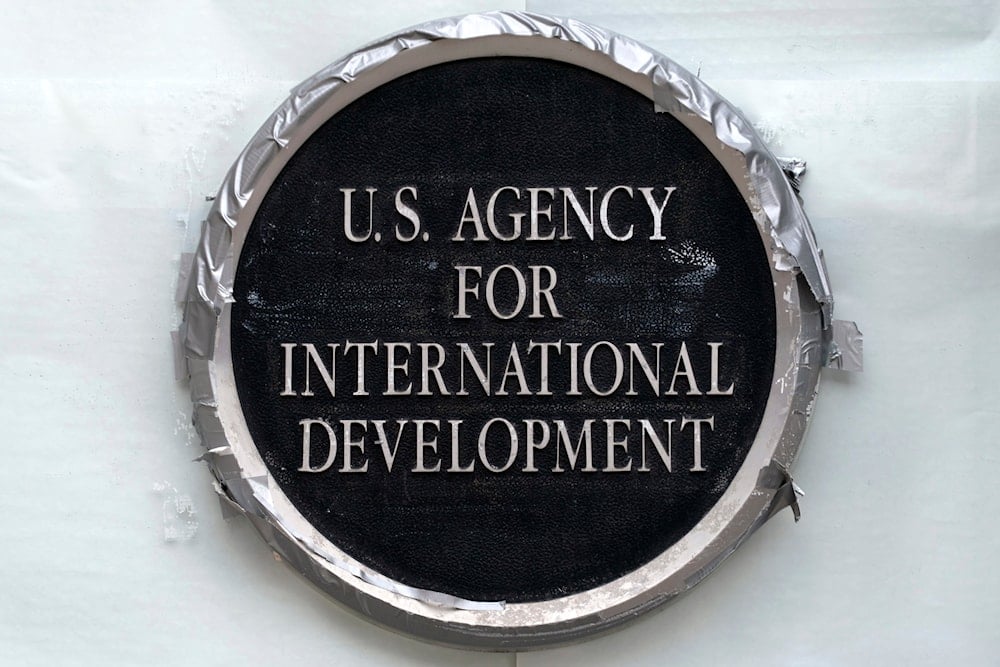Trump’s USAID cuts expose flaws of global aid dependence
While Trump’s USAID exposed the flaws in foreign aid, the reaction in Sierra Leone reflected decades of dependency and disillusionment.
-

The sign of the former US Agency for International Development is seen at the former building in Washington, Thursday, Feb. 27, 2025 (AP)
Mara Kardas-Nelson examined in a report for The Guardian the global reaction to Donald Trump’s drastic cuts to USAID, the US agency responsible for international aid. While many observers warned that such reductions could trigger famine, halt healthcare, and potentially kill millions, some communities long accustomed to foreign aid, like Sierra Leone, responded with weary acceptance rather than panic.
In Kono and Freetown, locals like David Kpakiwa have experienced decades of aid ebbing and flowing, from early Peace Corps volunteers in the 1960s and 1970s, through Cold War era development projects and post-civil war interventions, to the billions poured in during the 2014 Ebola outbreak.
According to Kardas-Nelson, for Sierra Leonians, the cycle of foreign promises and withdrawals is familiar, and sudden cuts were seen as part of a predictable pattern rather than an unprecedented crisis.
Trump’s appointed aid chief, Jeremy Lewin, justified the cuts by arguing that traditional aid programs had failed to create self-sufficiency and instead fostered dependence. Critics countered that abruptly slashing funding could endanger millions by halting essential health services, food programs, and development projects.
Foreign aid's long cycle in Sierra Leone
Sierra Leoneans had seen similar patterns before. Peace Corps volunteers in the 1960s and 1970s offered small-scale aid and cultural exchange but often left little lasting impact. Post-war NGOs provided ambitious projects such as schools, water pumps, and settlements for amputees, yet many were poorly coordinated and ephemeral, and the overall economy remained dependent on aid.
The narrative is based on David Kpakiwar's life, which was shaped by decades of foreign intervention and the shifting patterns of aid in Sierra Leone. He grew up during the height of the country’s diamond boom, attending schools dominated by British teachers and observing early Peace Corps volunteers.
As a young man, he moved to Liberia, where he lived with a legendary Peace Corps volunteer named Duncan, who had married locally and worked with the government. These experiences exposed David to the dual nature of foreign influence: on the one hand, practical improvements such as electricity and schooling; on the other, the lingering sense that outsiders controlled resources and decision-making.
Testimonies firsthand
The civil wars in Liberia and Sierra Leone deepened his wariness, as he witnessed foreign troops, private contractors, and international agencies intervene with little accountability, leaving civilians exposed to violence and displacement.
After the wars, David returned to Kono, where he rebuilt a homestead near new settlements for war amputees and began cultivating tropical flowers, a small act of stability and pride amid lingering poverty. He hosted visiting students and researchers, teaching them about Sierra Leonean history, customs, and the complexities of foreign aid.
He lived through the Ebola outbreak, observing the rapid influx and equally swift withdrawal of billions in international aid, which saved lives but also highlighted the inequalities and transience inherent in the system.
Over the years, David developed a critical but tempered perspective: he recognizes the potential value of aid when thoughtfully applied but remains cautious, knowing firsthand how projects can come and go, leaving communities dependent and disillusioned.
Foreign staff benefit more than locals from foreign aid
The author’s own reflections underscore the moral tensions of foreign intervention. As a global health consultant during Ebola, she saw highly paid foreign staff designing reforms over luxurious accommodations while local clinicians worked under dire conditions.
For many Sierra Leoneans, such interventions reinforced the sense that aid was a form of dependency or soft colonialism, providing short-term relief without structural change.
Kardas-Nelson concludes that while Trump’s cuts may seem reckless, they reveal a long-standing truth. Global aid has been paternalistic, unsustainable, and often more beneficial to outsiders than the communities it purports to help. As David muses, “If you’re dependent too much, you’re not going to be happy … We’re still very much in-dependence.”

 4 Min Read
4 Min Read








